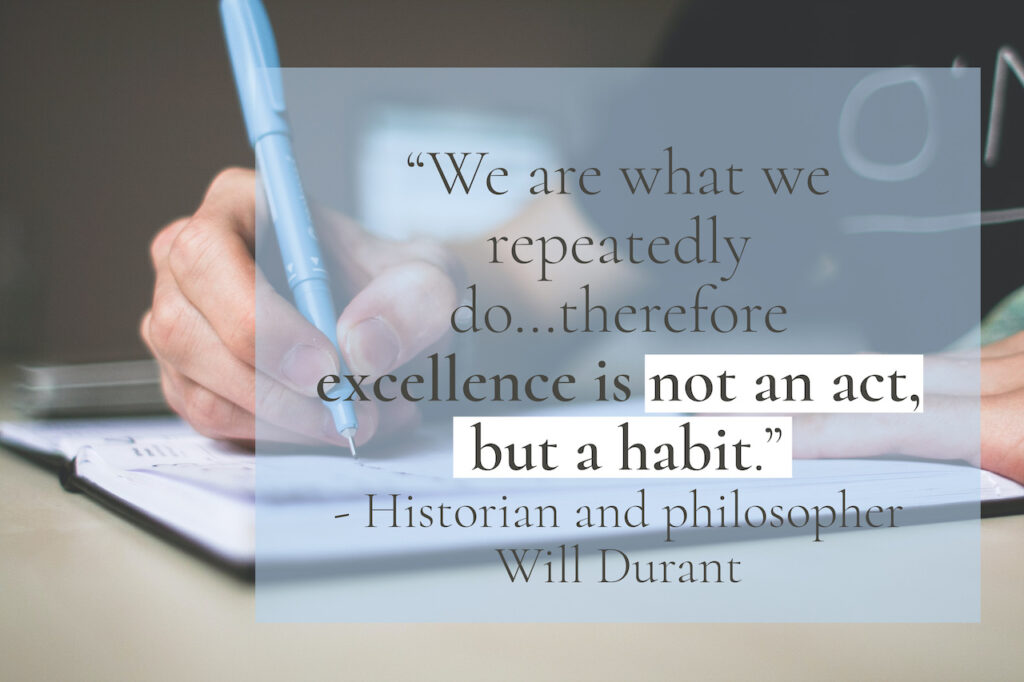 Building the Habits of Excellence
Building the Habits of Excellence
Excellence is not something we just fall into; it’s something we strive after.
This theme played out continually throughout the course of the first semester of Christian Leadership, a class of sophomore through senior students that I had the blessing to teach this fall. I can’t speak for them, but I often left class with the unsettling conviction that I needed to examine my own life, my only choices, and to ask whether I am truly pursuing excellence in my own life.
This journey into accidental self-discovery all started while sitting down to prep the class. I debated which of the many great leadership books to use, and determined that as a pastor, the book Lead Like Jesus only made sense. The premise of this leadership book is to learn about Jesus’ model of leadership (hard to argue against his success) and to emulate the intentionality of Jesus’ use of his heads, hands, heart and habits.
I have found that individuals of a particular age group (of which these students are) often like the idea of being the leader; they like the idea of being the one in charge. However, one sentence in an early chapter of this book turned this idea on its head and set the course for most of this first semester. This sentence challenged the reader, “You can’t lead others if you can’t lead yourself first.” With that sentence, we put aside Lead Like Jesus temporarily and focused our attention on a new book, 7 Habits of Highly Effective Teens. If you haven’t heard of it, it’s the principles of the famous leadership book, 7 Habits of Highly Effective People, but written in a way that engages people who aren’t at the age yet where they’re planning any corporate take-overs.
For the next ten weeks we spent time talking about these seven habits:
- Be Proactive.
- Begin With the End in Mind.
- Put First Things First.
- Think Win-Win.
- Seek First to Understand, Then to Be Understood.
- Synergize.
- Sharpen the Saw. (This has nothing to do with being a lumberjack, but instead how are you improving yourself in a well-rounded fashion).
The purpose of the class was not to study for tests or write long essays, but instead to engage in dialogue, to get the students to think outside of themselves and their own world, and more importantly to help them realize if they don’t take control of their lives, then they are leaving their lives up to circumstances. In leadership and in life, they need to be intentional about instilling these habits of excellence.
To that end, early in the semester, each student selected an area of their life upon which they wanted to improve: not procrastinating, saving money, becoming healthier, etc. From there, I gave them three specific measurables to gauge their effort of self-improvement, which they worked on during the semester. For our final project, each student gave an 8-minute presentation on the insights they learned throughout the process. The insights these kids had were so encouraging in showing how they understood this material. Some were honest in owning why it’s hard changing bad habits. Others recognized that without measurables we can’t gauge progress. And I think all recognized that not trying will always lead us to the same disappointing outcome.
Writing those last couple of sentences reminds me that if I take nothing from this class, then I’ll have failed my students and myself. The call of the Christian is to be pursuing holiness with our lives, but how can we do that unless we are intentional about doing that? I have yet to find the holiness tree where you eat the magic fruit from it and suddenly everything is easy. Unwinding a life of bad habits is hard when you’re as old as I am, which is maybe why I was so passionate about trying to get these kids to avert those trappings before they fall into them.
I loved teaching and spending time with these students. They were bright, challenging (in a good way) and engaging. It was everything I could have hoped for when I agreed to teach this group. But my favorite part was the last ten minutes of the class. No, not because it was the last ten minutes of the class, but because I had the opportunity to tell these kids how much God has gifted them all uniquely! I loved that I could share with them that our Creator created them with an intentional purpose. They have meaning and value in this world. They were not created to be utilitarian cogs in a machine, but instead individuals gifted to do works that will have an eternal impact. God was intentional in creating them, and they are invited to be intentional in developing the gifts He gave.
It’s not a message teenagers hear too often, one that tells them how meaningful their lives are, but I will swear by this: that even among the uncomfortable teenage stares of “ugh, this guy is getting all mushy on us,” there was a glimmer of delight in their eyes as they heard that they matter to their Creator. I am glad I had this time with them and I hope and pray the tools they have been given during their time at the Academy help them pursue excellence to become the world changers God created them to be.

Pastor Dave Ryerson
Assistant Pastor
